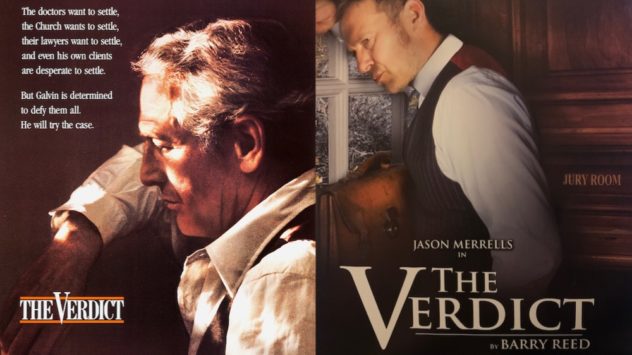
I don’t think it is any secret that I like a good courtroom drama; this is, in no small part, thanks to my mother who was always watching things like Crown Court, Rumpole Of The Bailey, and The Main Chance. In my list of favourite films there are four that feature dramatic courtroom scenes; Bridge Of Spies, Runaway Jury, A Few Good Men, and Kind Hearts And Coronets. In my wider film collection I also have To Kill A Mockingbird, 12 Angry Men, A Time To Kill, The Trial Of The Chicago 7, Denial, The Accused, and JFK among others. And, foremost amongst those others is, The Verdict.
Remember The Verdict? It came out way back in 1982.This still gives me a twinge in the lower back and makes my knees ache when I remember that it was over forty years ago that I sat in the cinema to watch it. It is an excellent film which was nominated for five Oscars; Best Picture, Best Actor (both lead and supporting), Best Director, and Best Adapted Screenplay. Well, back then it was called “Best Writing, Screenplay Based on Material from Another Medium” but it’s the same thing really. What a stroke of bad luck that it came out in 1982!
Join the PERA (Personal Entertainment Research Assistant) waitlist.
The World’s Most Indispensable Movie App
The RunPee app tells you the best times to
run & pee during a movie
so you don't miss the best scenes.
Download the RunPee app.
100% free (donation supported)
Bad Timing!
Also nominated for best picture were Gandhi, E.T. The Extra-Terrestrial, Missing, and Tootsie. I have to admit that I don’t recall Missing but I did see the other three and wasn’t really surprised when Gandhi won it. Gandhi also spoiled the party for Paul Newman and Sidney Lumet. An Officer And A Gentleman and Louis Gossett Jr took the Supporting Actor gong away from James Mason while the aforementioned Missing scooped up the Best Adapted Screenplay award. Ah well, c’est comme ça!
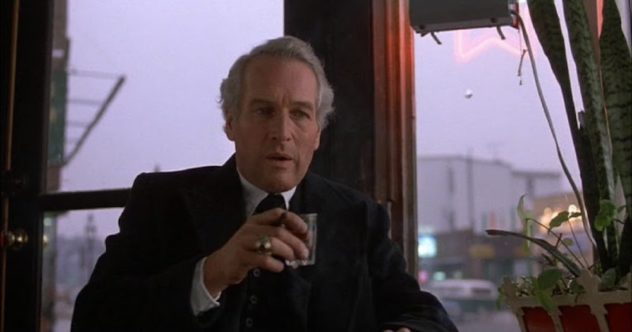
 I suppose, at this point, I should say what The Verdict is all about. Frank Galvin (Paul Newman/Jason Merrells) is a lawyer in the heart of Boston. As a high flyer he was taken on by the city’s most prestigious law firm, a position aided by a ‘political’ marriage. He butted heads with the partners over a matter of principal; he wanted to do the right thing, while they wanted to get the biggest pay out. As a result he ended up divorced, unemployed, and very nearly disbarred. He is also an alcoholic. One has to assume that all those events are intertwined. As a result, he now scrapes a living as an “ambulance chaser” and has only had a handful of cases in years.
I suppose, at this point, I should say what The Verdict is all about. Frank Galvin (Paul Newman/Jason Merrells) is a lawyer in the heart of Boston. As a high flyer he was taken on by the city’s most prestigious law firm, a position aided by a ‘political’ marriage. He butted heads with the partners over a matter of principal; he wanted to do the right thing, while they wanted to get the biggest pay out. As a result he ended up divorced, unemployed, and very nearly disbarred. He is also an alcoholic. One has to assume that all those events are intertwined. As a result, he now scrapes a living as an “ambulance chaser” and has only had a handful of cases in years.
Those Ambulances Won’t Chase Themselves
A friend of his, Mickey Morrissey/Moe Katz (Jack Warden/Vincent Pirillo), gets him a medical negligence case which should be settled out of court for $210,000. In the book this amount is significant and is known as a “guzinta” because Frank takes a third of the award as his fee and three goes into 210,000 exactly. However, Frank decides to go and visit the negligence victim and decides not to settle but to fight for justice and a higher amount for the victim who was put into a persistent vegetative state by an incorrectly administered anaesthetic.
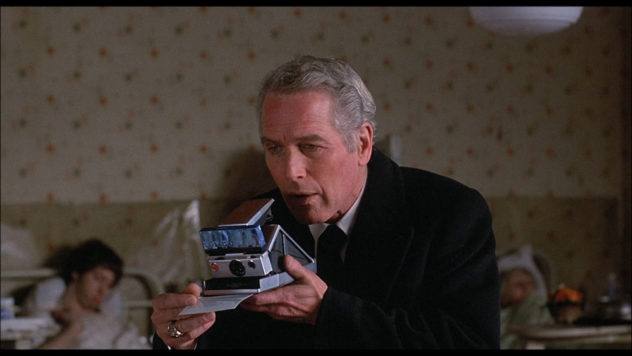
Frank decides to go up against the church maintained hospital, the church itself, the doctors, a top notch defence lawyer, and an unfriendly judge. As is usual, this is the point when I stop because of incipient spoilerdom. However, anyone who’s ever seen an underdog film knows which way the the cookie crumbles. Plus the fact that everyone knows that there’s a result in every court case so it has to be a win, lose, or draw. And, frankly, draw is a pretty rare occurrence so we’re looking at a fifty/fifty outcome.
I’ve Seen Every Version…
As I said earlier, I saw The Verdict in the cinema on release. Since then I’ve seen it a fair few times. I bought a copy on VHS for my mother. Oh, younglings, VHS is what we used before DVD, Blu-Ray, or even the Cloud was thought of let alone invented. I think I replaced it with a DVD when she upgraded her audio-visual equipment. It’s one of those titles which I’ve bought in all media; VHS, DVD, Blu-Ray, and download. Throw in that I also saw it on the cinema and watched it on TV then I think I’ve pretty much ticked off every box on that particular list.
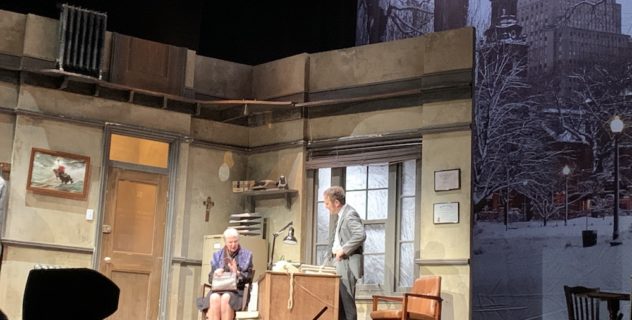
Or so I thought! I’ve mentioned about my local live entertainment venue, the Floral Pavilion, and I got their latest brochure. What should be in there but a stage production of, yes, The Verdict! Obviously, I booked tickets straight away! It may sound odd but I do have favourite seats; C12 and C13. I’m not huge, you understand, but I do usually go with either my wife or daughter. They are near enough to the front to see every detail and hear every word but not so close that you have to lean back to see over the apron. They are also adjacent to the aisle so I can stretch out my legs.
What people are saying
about the RunPee app.
November 17, 2019
One of the most useful apps I’ve ever come across. I’ve used it for years and recommended it to all my friends. Even if I’m not the type to have to pee during movies often, being able to pull up the app and pass my phone to my mom/friend/grandma so that they know when to go to the bathroom has been invaluable. Because then I don’t have to summarize anything when they get back!!
View all reviews
Apple App Store | Google Play Store
Download RunPee app
…Haven’t I?
The thing that I was most keen to see is what changes had to be made to get the story across. I’ll admit that the usual transference that I’ve seen is from TV to film or vice versa. But a move to theatre is totally different. With TV and film you can quickly cut between scenes. So, in The Verdict (film), you can quickly jump from Frank’s office, to the bar, to the hospital, to the courtroom, to his flat and so on and so forth. Quick cuts aren’t easily managed on the stage. The script has to be written so that locations are used for a reasonable amount of time.
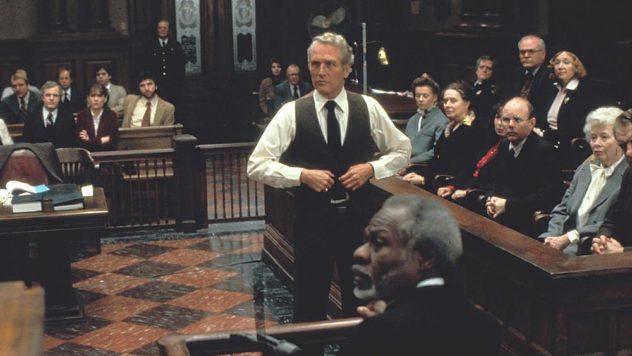
For instance the film version starts with Galvin drinking and playing pinball in a bar while the credits roll. It then cuts to Galvin slipping a funeral director some money. He uses a breath freshener and goes to give his card to a recently bereaved widow. Another cut to him in a bar drinking and reading the obituary column. The next cut has us in another funeral home giving his card to another widow. This time, though, the son cuts up rough and has him thrown out. He walks away and we dissolve into another bar scene. We’re five minutes in and we’ve been in three bars, two funeral homes, and a street scene.
If It Works…
The play handled things differently, obviously! I was mildly surprised because the curtain came up while the house lights were still on. The stage was in darkness but you could make out that one side was dressed as an office while the other was a bar. When It came time for the performance one side or the other was lit up. The first side to be lit up was the office. It was quite the surprise when, with the house lights still on, the action started. After a few minutes you realised that there was someone on the stage.
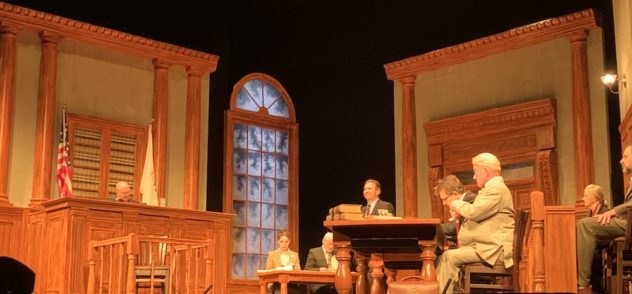
It was Frank Galvin (Jason Merrells) and his alcoholism was being illustrated by him being seen waking up under his desk rather than being shown in a number of bars. He went through a typical morning routine; changing his shirt, brushing his teeth, combing his hair, etc. but with a few additional shots of Jameson’s! It took about five minutes before the first line of dialogue and the house lights went down. The actors performed on one side of the stage until the end of the scene. The lights dimmed and the other side of the stage was illuminated to show that we were in the bar. The second half was set solely in the courtroom apart from one scene in a café.
…Don’t Fix it
Occasionally the lights would dim and a backdrop would be lowered to show we were in a different place; a hospital, the defence offices, a dining room, to name but a few. What was absolutely riveting, though, was the almost balletic movements of the cast between scenes. Although the stage lights were turned down, it was still light enough to see the cast members moving around. They had obviously planned who would move the tray with the tea pot on it, who would move the table, who the chairs. I could imagine if I were up there I’d have been bumping into someone or tripping over something!
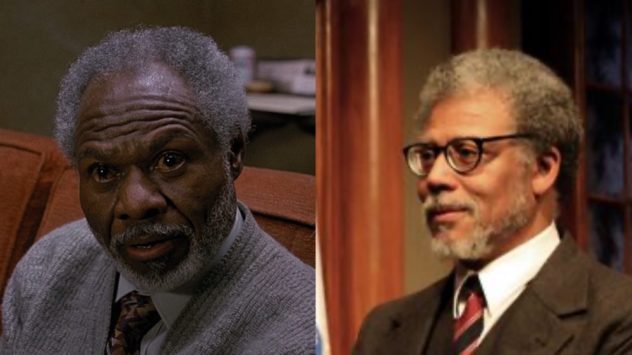
So was there any differences between the two versions? One or two but nowhere near as many as I was expecting. The basic premise is the same; a young woman is negligently given the wrong anaesthetic while giving birth to her third child. Frank is supposed to settle out of court but has a pang of conscience and decides to fight the case. In the film it is the woman’s sister and brother in law who are making the claim, whereas on the stage it was the woman’s mother. Other than that, the story is, pretty much, the same. A few names are different but that is all. The incident, the development, and the denouement are the same.
Less Is More
One minor difference is in the expert witness. In both versions, the original expert witness is “encouraged” to disappear and Frank has to find a replacement. The new expert is the same in both; an older man, a less experienced doctor, a serial expert with a number of cases under his belt, and…black. In the film this is made more of than on the stage. That may be a reflection of our more enlightened times but Paul Newman was deeply disappointed when he realises that his Dr Thompson (Joe Seneca) is black whereas Jason Merrells was quite happy to meet his Dr Thompson (Okon Jones). Another small to the point of “why bother” change was Frank’s former partner who helps him out and finds cases for him; in the film he is called Mickey Morrissey (Jack Warden) but in the play he is Moe Katz (Vincent Pirillo).
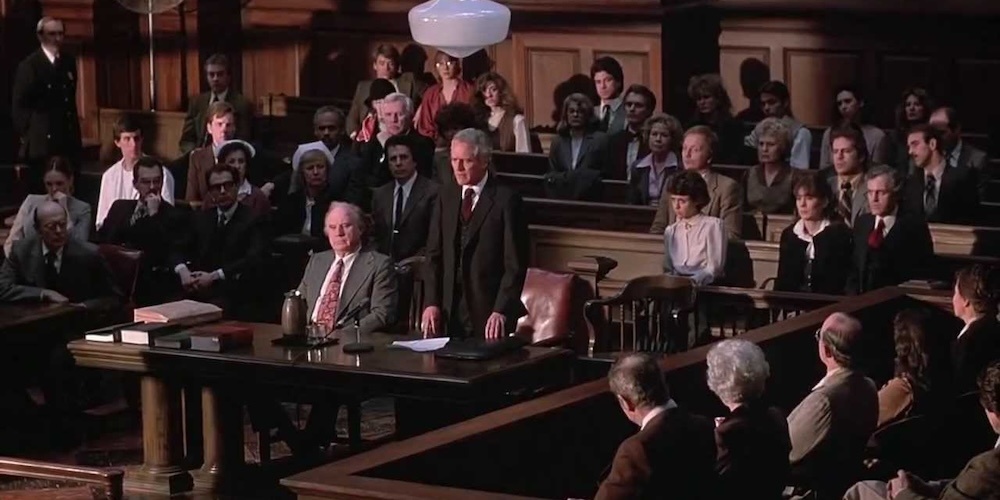
So, I suppose I should apologise to the people who had to sit behind me as I was bolt upright on the edge of my seat throughout the entirety of the performance; no slumping down in my seat for this one. It was one of those performances of which I was confident of knowing the ending but was still gripped throughout. An excellent cast, in a very well directed (by Michael Lunney), performed, stage managed, and whatever else goes on in a theatrical production. I shall look out for future productions by the Middle Ground Theatre Company! One thing that you don’t get in the stage version…a chance to see uncredited early performances by Bruce Willis and Tobin Bell as courtroom observers!


Leave a Reply